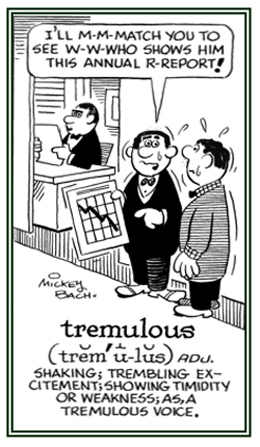tremo-, tremor-, tremb-, trem-; tremul- +
(Latin: shivering, shaking, quivering)
Alcohol withdrawal delirium may also be triggered by head injury, infection, or illness in people with a history of heavy use of alcohol."
Alcohol withdrawal delirium tremens is most common in people who have a history of alcohol withdrawal, especially in those who drink the equivalent of seven to eight pints of beer (or one pint of "hard" liquor) every day for several months. Alcohol withdrawal delirium tremens also commonly affects those with a history of habitual alcohol use or alcoholism that has existed for more than ten years.
Alcohol withdrawal delirium tremens symptoms occur because of the toxic effects of alcohol on the brain and nervous system. It may be severe and get worse very quickly which is a life-threatening condition that requires immediate medical attention.
The treatment of alcohol withdrawal delirium tremens includes observation, comfort care, and in some cases medication.
2. Being in a state of shaking or trembling, as from fear or excitement.
2. To move or jerk quickly and involuntarily up and down or sideways.
3. To shake with slight movements, continuously and uncontrollably; for example, from anger or extreme anxiety.
4. To shake or to vibrate as a result of an external force: "They felt the house tremble as the train roared by."
2. A person who shakes involuntarily; as with fear or cold, shiver.
3. British: an automatic vibrator for making and breaking an electric circuit.
Affected animals tremble and become weak.
2. An intoxication of cattle, caused by eating white snakeroot, Eupatorium urticaefolium, or the rayless goldenrod.The active agent is a higher alcohol, tremetol, which intoxicated cows eliminate in their milk, causing milk sickness when ingested by humans.
2. Shaking; tottering; quivering.
3. Vibrating slightly and irregularly; such as, with fear or cold.
2. Quivering; tremulous; shivering.
2. Shaking or trembling; usually resulting from weakness, stress, or disease.
3. A sudden and usually brief feeling of excitement, nervousness, or anticipation: "Tremor or shaking movements in a person's body; usually, because of fright, excitement, or an illness."
4. A small seismic activity; such as, a minimal earthquake: "Tremors from an earthquake may have sudden and violent movements coming from the earth's surface."
2. Etymology: from Latin tremulus, "shaking, quivering" from tremere, "to shake, to quake, to quiver."


